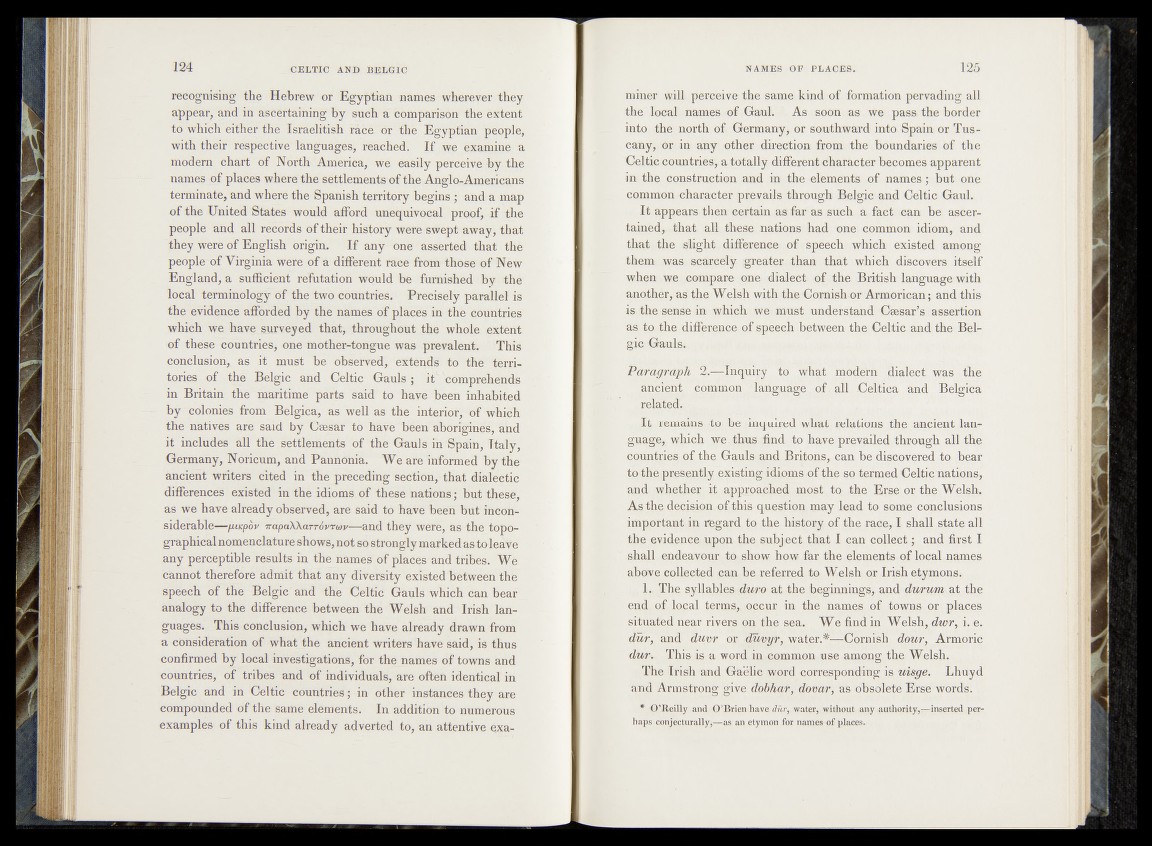
recognising the Hebrew or Egyptian names ^wherever Ifhey
appear, and in ascertaining by such a comparison th e ‘épient
to which'either the Israelitish race, or the Egyptian people/
with their respective" languages, reached. If we examine a
modern chart of North "America, we easily perceive by the
names of places where the settlements of the AnglcnAmericans
terminate, and where the Spanish territory begins ; and a map
o f the United S ta te would afford unequivocal proof, if ifehe
people and all records of their history were swept away, th at
they were of English origin. I f any one asserted that the
people of Virginia were of a different race from those of New
England, a sufficient refutation would be furnished by thé
local terminology of the two countries* Precisely parallel is
the evidence afforded by the names of places in the countries
which we have surveyed that, throughout the whole »extent
of these countries, one mother-tongue was prevalent. This
conclusion^ as it must be observed, extends to the territories
of the Belgic and Celtic Gauls ; it^ comprehends
in Britain the maritime parts said to have been inhabited
by colonies from Belgica, as well as the interior, of which
the natives are said by Cæsar to have been aborigine's, and
it includes all the settlements of the Gauls.in (Spain, Italy,
Germany, Noflcum, and PannOnia. We.are informed by the
ancient writers cited in the preceding section,“ that dialectic
differences existed in the idioms of these nations ; but these,
as we have already observed, are said to have been but inconsiderable—
pticpov TrapaXKarrâvviov—and they were, as the topographicalnomenclatureshows,
not so strongly marked astolea?e
any perceptible results in the names of places and tribes. Wp
cannot therefore admit that any diversity existed between the
speech of the Belgic'and the Celtic Gauls which can bear
analogy to the difference between the Welsh and Irish languages.
This conclusion, which we have already drawn from
a consideration of what jh e ancient writers have said, is thus
confirmed by local investigations, for the names of towns and
countries, of tribes and of individuals, are often identical in
Belgic and in Celtic countries; in other instances they are
compounded of the same elements. In addition to numerous
examples o f this kind already adverted to, an attentive examiner
will .perceive,the same kind of formation pervading all
the local names of Gaul. As soon as we pass the border
ipto .vthe north of Germany, or southward into Spain or Tuscany,
Or in any other direction ISfe^-the boundaries of the
Celtic, countries, a.totally different character becomes apparent
in tho; pc^tpicrion awl in the elements of names; but one
Qbmmon character prevails through Belgic and Celtic Gaul.
I t appears then-certain as far as ,such., a, fact can be ascertained,,,
that all these nations had one. common idiom, and
that the »slight difference pfi -speech which existed among
them was scarcely greater than that whiqH^discovers itself
when we compare one dialect of the .British language with
another,^# the Welsi:h with the CcemishDr Armorican^ add this
is. the sense in which we must understand Gsesar’s assertion
as,i t^ th e (lifternne^f speech between the, Celtic and the Belgic
Gauls. [
R a ra g ra p n ^ — Inquiry to what modern pia-lept! .was,? the
, jiiicicnt common dangyage ’-M.all. C ^ tica and Belgica
I t remains^to, be -inquired what relations the aneient lan-
gpagf»; which we.thus find to have.prevailed through all the
cpuntrieaof the(^.ute^and Britons, can.be discovered to bear
to f t ^ presently existingjddioms of th e so termed Celtic'nati<5n |^
and. whether;A approached most^to the Erse or the Welsh.
Agth'e decjsjon of this question may lead to some ccmclusions
important in regard tO ithe history of the race, I shall state all
the .evidence.upon the subject that I can collect; and first I
shall endeavour to show how far the elements of local names
above collected can be referred to Welsh or Irish etymons.
1. The syllables duro at the beginning; and durum at the
end of local terms ,4pccur in the names of towns or places
situated near rivers on the sea. We find in Welsh, dwr, i. e.
dur, and duvr or duvyr, water.*—Cornish dour, Armoric
dur. This is a word in common use among the Welsh.
The Irish and Gaelic word corresponding ip uisge. Lhuyd
and Armstrong give dobhar, dovar, as obsolete Erse words. .
* O’Reilly and O’Erien have d u r , water, without any authority,:—inserted .perhaps
conjecturally,—as an etymon for names-of places.